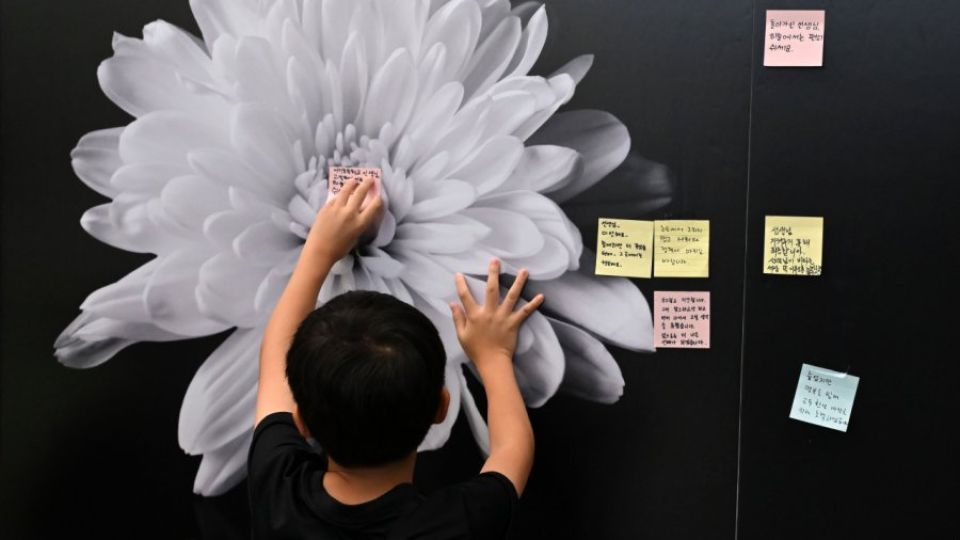September 5, 2023
SEOUL – Unleashing a wave of anger over a series of suicides, teachers took to the streets across the nation Monday in an unprecedented move, demanding immediate legal protections to reinstate their authority when dealing with unruly students and pushy parents.
Holding pickets reading “A Day to Pause Public Education,” tens of thousands of teachers participated in rallies held in different locations across the country, leaving their classrooms behind despite governmental warnings of disciplinary action.
Sparked by the death of a 23-year-old primary school teacher in Seoul who took her own life in July, teachers had been holding rallies on weekends.
Monday’s rally marked a historic moment in South Korea, as it was the first time that teachers without any affiliation to politically oriented educator groups came together for collective action.
The teachers’ demonstrations prompted some schools to shut down temporarily, as many educators simultaneously took a leave of absence. A total of 37 schools nationwide, with Seoul having the highest number at 11, were closed on the day. Eight schools in the administrative city of Sejong, three in Incheon, one in Ulsan, and seven in Gwangju and South Chungcheong Province each also closed their doors due to a staff shortage. As the teachers’ rallies left students and parents confused, the Seoul Metropolitan Office of Education dispatched nearly 900 education personnel to help understaffed schools continue their activities. Parent volunteers also turned up at schools to help with the operations and support teachers in taking the day off for the strike.
In the early morning hours, hundreds of incumbent teachers, retirees and their supporters gathered at Seoi Elementary School in Seoul’s Seocho-gu to pay tribute to the late teacher who had grappled with a high volume of work and parental complaints.
As part of a daylong rally, a commemoration ceremony was held at the elementary school for the bereaved family at 3 p.m., with Education Minister Lee Ju-ho, Rep. Yun Jae-ok of the ruling People Power Party, superintendent Cho Hee-yeon, the late teacher’s colleagues and chiefs of major teachers’ unions in attendance.
“I’ll take the time to look back and see if I’ve been ignoring teachers’ voices demanding for better protection of their rights,” Minister Lee said during the commemoration event, vowing that he would look closely into the overall educational landscape.
Following the commemoration ceremony, teachers took themselves to the National Assembly later in the afternoon to demand the parliament revise the Child Abuse Crimes Act. Between 10,000 and 20,000 people are thought to have participated in the rally, as a large number of teachers joined the sit-in protest after work.
Teachers have been calling for more feasible measures and amending a Child Welfare Act clause allowing teachers to discipline students without being so susceptible to child abuse claims by parents. Once a teacher is accused of child abuse, the accused teacher cannot return until cleared of the abuse allegation, and he or she is replaced with a substitute teacher. The government has been both pleading with and warning teachers, rolling out new class policies to guarantee teachers are able to remove disruptive students from their classes and confiscate their phones, and requiring parents to schedule meetings to talk to the teachers. Despite the ongoing policy changes, teachers have consistently been raising their voices in pent-up anger, according to observers, who also referred to two more teachers who took their lives over the weekend.
In light of the rally, President Yoon Suk Yeol on Monday instructed aides to “spare no effort in guaranteeing teachers’ rights” and “normalizing the education field.”
“Deeply bear in mind the voices shouted by teachers and do the utmost to guarantee their rights,” he was quoted as saying by his spokesperson Lee Do-woon.
Parties on both sides of the aisle, however, remain divided over teachers’ rights. While the ruling party said it would work together with other parties to swiftly pass the bill aimed at protecting teachers’ rights, Rep. Lee Jae-myung of the main opposition Democratic Party of Korea said that lawmakers should stand next to teachers and listen and understand them, and discuss ways to solve their problems.
Clad in black, the visitors lined up for a moment of silence in front of a temporary commemoration site set up at Seoi Elementary School to mark the 49th day since the teacher’s passing, in line with the Buddhist belief that a deceased spirit leaves the human world 49 days after death.
A retired teacher in her 60s surnamed Kim told The Korea Herald that she was in attendance in hopes that teachers could feel the happiness of teaching kids in their classrooms.
“I worked as a teacher who was respected and loved (by students and parents), but the education landscape has seismically changed where teachers are no longer revered. What I can do as an older adult is to be on the teachers’ side by participating (in the rally),” she said.
Referring to herself as a “victim of excessive parental complaints and pushy parents,” an elementary teacher in Seoul with seven years of experience surnamed Kim said she visited the space because the teacher’s death had resonated with her.
“The Education Ministry seems reluctant about shielding teachers from being accused of child abuse by parents. Then teachers will continuously be exposed to the threats of child abuse claims throughout their career,” Kim said as she held back tears.
A parent of Seoi Elementary School, who wished to speak under the condition of anonymity, along with her fourth-grader son, took a day off from work to honor the late teacher.
“It’s heartbreaking to see such an incident happen in our school community. I want to say that not all parents and students are rude. That’s only a small piece of the whole, and I genuinely hope that teachers will be ensured better rights,” she said.


